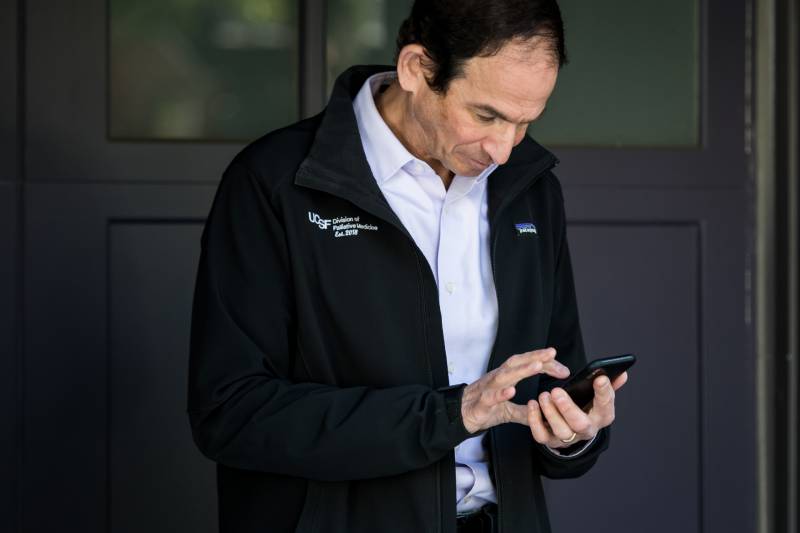Pantilat’s wife is also a doctor. She’s been on the front lines in the hospital, caring for COVID-19 patients. The concern with carrying the infection home has led to some elaborate routines.
“She undresses in the garage, leaves her shoes there, wipes everything down, including the car, her shoes, her stethoscope,” Pantilat said. “She comes into the house, undressed — all the clothes go directly in the washing machine. She goes to the shower first thing. We then wipe down every door knob and surface that she touched on the way in the house. And then, we say hello.”
Pantilat, on the other hand, has been protecting himself and his team by working almost exclusively from home, doing his consults over video. While doctors would normally sit on the side of a patient’s bed and hold their hand when delivering bad news, now, all patients have to hold is an iPad.
“In order to limit exposure of our staff and to preserve the personal protection equipment, we’ve decided that we will see patients as much as we can by telemedicine, even for patients in the hospital,” he said.
Family and visitors are limited to video and phone calls, too. This is hard for doctors like Pantilat, who have made it their life’s work to honor peoples’ last wishes.
“I’ve been in rooms where there are 35 family members, people are playing music and holding a vigil and saying prayers and singing,” he said. “They’re even having weddings in the hospital. Just last month, we had another wedding for someone who was dying.”
But in the age of coronavirus, all that is out. There’s too much risk of visitors getting sick and there aren’t enough masks to go around. So the new policy at UCSF is one visitor, and only for patients who are actively dying.
“We’ve never really faced this before of trying to make these really kind of gut wrenching decisions about visitation and when and who and how many,” he said. “I think that’s really, really, really distressing for everyone involved.”
Many of these kinds of decisions are rushed right now. In some cases, COVID-19 can progress so fast, there’s not enough time for a considered conversation with patients about what kind of care they’re willing to have, what’s important to them, and what they want for the end of their lives. Pantilat says we should all be having these conversations with our loved ones now.
“Some of us who might not have thought about these issues and thought, ‘Oh, I’ve got a lot of time before I have to worry about this,’ are suddenly facing the reality that you could get suddenly sick and suddenly very, very sick,” he said.
Just in case, we should all be saying our goodbyes.
“No harm in saying, I love you and thank you and forgive me and I forgive you to the people you care about at any time,” he says. “It’s a really good time to do that now.”

